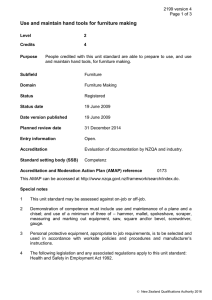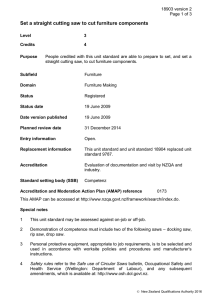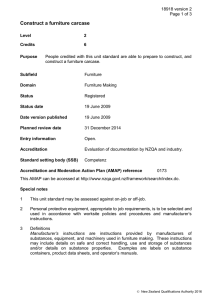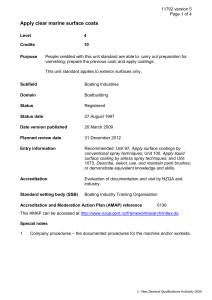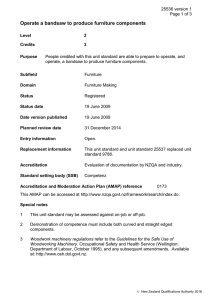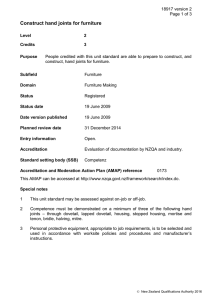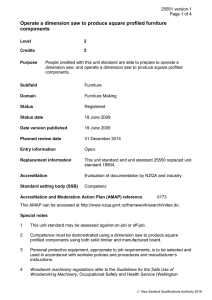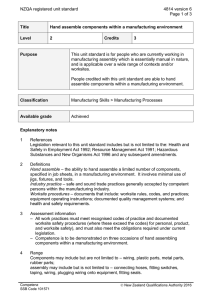Operate a Computer Numerical Controlled (CNC) machine to produce furniture components
advertisement
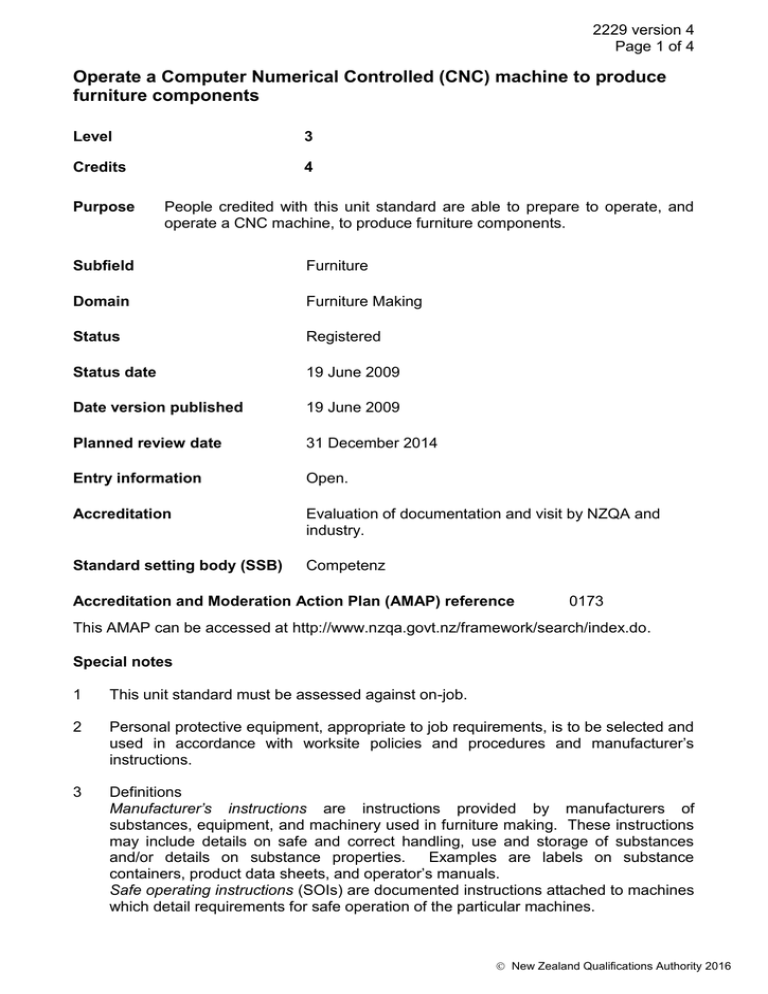
2229 version 4 Page 1 of 4 Operate a Computer Numerical Controlled (CNC) machine to produce furniture components Level 3 Credits 4 Purpose People credited with this unit standard are able to prepare to operate, and operate a CNC machine, to produce furniture components. Subfield Furniture Domain Furniture Making Status Registered Status date 19 June 2009 Date version published 19 June 2009 Planned review date 31 December 2014 Entry information Open. Accreditation Evaluation of documentation and visit by NZQA and industry. Standard setting body (SSB) Competenz Accreditation and Moderation Action Plan (AMAP) reference 0173 This AMAP can be accessed at http://www.nzqa.govt.nz/framework/search/index.do. Special notes 1 This unit standard must be assessed against on-job. 2 Personal protective equipment, appropriate to job requirements, is to be selected and used in accordance with worksite policies and procedures and manufacturer’s instructions. 3 Definitions Manufacturer’s instructions are instructions provided by manufacturers of substances, equipment, and machinery used in furniture making. These instructions may include details on safe and correct handling, use and storage of substances and/or details on substance properties. Examples are labels on substance containers, product data sheets, and operator’s manuals. Safe operating instructions (SOIs) are documented instructions attached to machines which detail requirements for safe operation of the particular machines. New Zealand Qualifications Authority 2016 2229 version 4 Page 2 of 4 Worksite policies and procedures refer to documented policies and to documented or other directions provided to staff. These may include, but are not limited to, ways of managing health and safety, environmental considerations, quality, and production, and must conform to legislation. Examples include standard operating procedures, company health and safety plans, on-site briefings, and supervisor’s instructions. Elements and performance criteria Element 1 Prepare to operate a CNC machine to produce furniture components. Performance criteria 1.1 Job specifications are obtained and explained in accordance with worksite policies and procedures. Range number of components, dimensions, material type, hole positions, hardware, time limits. 1.2 Material is selected in accordance with job specifications, stacked, and positioned in accordance with worksite policies and procedures. 1.3 Machine safety features are identified and their purpose is explained in accordance with manufacturer’s instructions. Range 1.4 Techniques for safely loading material onto the machine are explained in accordance with worksite policies and procedures. Range 1.5 carrying, lifting. Environmental and safety requirements are met in accordance with worksite policies and procedures. Range 1.6 includes but is not limited to – emergency stop, guards, isolating switch. electrical power, lighting, ventilation, dust extraction. The machine fields to be used and the positioning of components within those fields are explained in accordance with job specifications. Element 2 Operate a CNC machine to produce furniture components. Performance criteria 2.1 Machine is started in accordance with SOIs. 2.2 One test piece of job material is run through the machine and checked in accordance with job specifications. The procedure for dealing with out of New Zealand Qualifications Authority 2016 2229 version 4 Page 3 of 4 specification components is explained in accordance with worksite policies and procedures. 2.3 Material is loaded into the machine in accordance with job specifications and SOIs. Range correct field, correct position, square to the stops. 2.4 Components are produced within the time limits in accordance with job specifications. 2.5 Off-cuts are removed from the work area during operation in accordance with SOIs and worksite policies and procedures. 2.6 Machine operation is in accordance with SOIs. 2.7 Output is monitored to ensure components meet job specifications. Range component dimensions, number of components. 2.8 The procedure to be followed when defects in components are identified is explained in accordance with worksite policies and procedures. 2.9 Components are stacked ready for the next operation in accordance with worksite policies and procedures. 2.10 Machine is put into safe mode after producing components in accordance with SOIs. 2.11 Machine is cleaned and waste material disposed of in accordance with worksite policies and procedures. 2.12 Work area is left clean, clear, and safe in accordance with worksite policies and procedures. Please note Providers must be accredited by NZQA, or an inter-institutional body with delegated authority for quality assurance, before they can report credits from assessment against unit standards or deliver courses of study leading to that assessment. Industry Training Organisations must be accredited by NZQA before they can register credits from assessment against unit standards. Accredited providers and Industry Training Organisations assessing against unit standards must engage with the moderation system that applies to those standards. New Zealand Qualifications Authority 2016 2229 version 4 Page 4 of 4 Accreditation requirements and an outline of the moderation system that applies to this standard are outlined in the Accreditation and Moderation Action Plan (AMAP). The AMAP also includes useful information about special requirements for organisations wishing to develop education and training programmes, such as minimum qualifications for tutors and assessors, and special resource requirements. Comments on this unit standard Please contact the Competenz at info@competenz.org.nz if you wish to suggest changes to the content of this unit standard. New Zealand Qualifications Authority 2016
